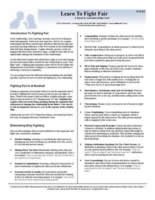All Couples Should Learn To FIght Fair. Here's How
Check out our mini-guide on how to fight fair, and stop letting badly handled conflict cause pain in your relationships. Download it NOW!
Search Our Network Of Business and Personal Development Sites
Empowering Employees Can Yield Unexpected Conflict and Resistance!
Thorny Problems
Empowerment Difficulties
Question:
Over the last few month I have been trying to encourage my staff to take on more responsibility, and to become more involved in branch decision-making. I have indicated at staff meetings that I wish to empower staff, and that I have an open door policy. So far nothing much has come of it. Staff seem hesitant to voice their opinions at staff meetings, and it almost seems that they don't want more involvement. I'm firmly convinced that our branch needs input from everyone, so I'm getting very frustrated and angry.
Response:
One common error that managers make in this area is to assume that all that it will take to empower staff is to invite them in, much like one would invite a houseguest into the house. It's a lot more complicated then that.
Keep in mind that staff who have worked in a more traditional hierarchical structure have developed some level of comfort with the status quo. We all get used to our work environments, and tend to resist change. It is even possible that some staff will not want more responsibility--they prefer the more predictable arrangement where the boss makes most major decisions, and tells them what to do. It may not be realistic to expect all staff will be eager to see themselves empowered.
Perhaps what is more important to recognize is that staff need much more than an invitation to participate. In order for people to fully participate in decision-making they need:
1. Clear understanding of what YOU mean by empowerment, and the responsibilities, limits and expectations you have regarding participation.
2. Clear understanding of your branch's goals, values and priorities. Decision-making cannot occur in a vacuum. When staff are not clear about goals, values and priorities, they, rightfully become hesitant to jump in, for fear of looking foolish.
3. A well thought out and effective way of moving information around the organization. As with goals, values, and priorities, staff must have all of the relevant information needed to make informed in-context decisions, or even suggestions.
4. A clear process for input into the decision-making process. One reason many organizations use self-directed work teams is that once they are up and running, they provide the process, or forum, for input, suggestions and decision-making. This process formalizes the staff participation process.
5. Management consistency. One thing about the empowerment process is that management can't offer it, then pull it back if the decisions that come from it don't match with what management would have decided on its own. That's not to say that managers must abide by every decision or suggestion offered by staff. It does mean that when managers overrule staff suggestions, that they must do so in the spirit of problem-solving rather than what can appear as arbitrariness. By the way, when staff are clear about organizational goals, values, and priorities, and have access to all information related to the decision at hand, they are less likely to make decisions that will be ineffective, or that require over-ruling.
6. Opportunity for skill development. People vary in terms of their ability to work productively with others, communicate their ideas, and do effective problem-solving. If we expect full participation, we must be willing to provide the tools for people to participate effectively.
7. A stable and respectful workplace. In organizations that have a history of unmanaged or mismananaged conflict, people will have learned that it's dangerous to participate in anything but a superficial way. People who have been often criticized in harsh ways, by management or peers will be very careful about how they become involved.
In closing, keep in mind that while you may want to have empowered staff, the staff may have other ideas, particularly if it isn't clear what that means. Take a wider view of the process, and anticipate that it may take quite some time for staff to develop an understanding of this new way of doing things.
 Manage Conflict - Resolve Conflict - Prevent Conflict
Manage Conflict - Resolve Conflict - Prevent Conflict 

